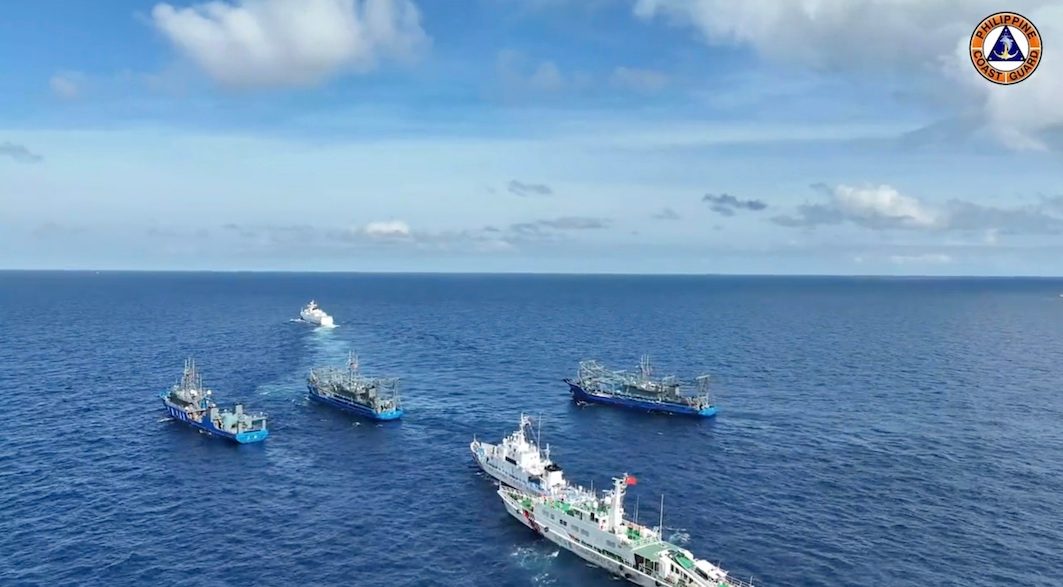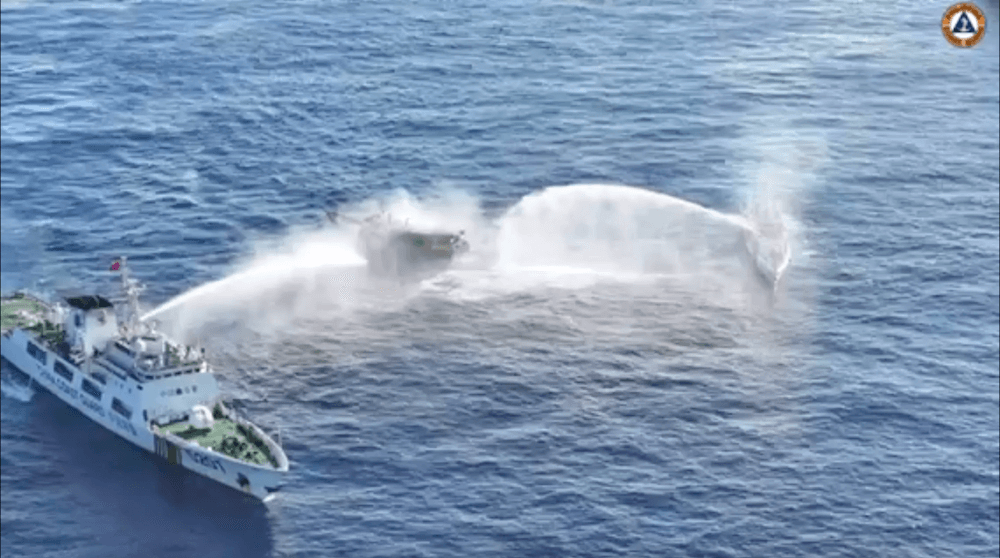SUMMARY
This is AI generated summarization, which may have errors. For context, always refer to the full article.

At least once a month, when the Philippine military and the Philippine Coast Guard voyage to Ayungin Shoal for a mission to bring new troops and supplies to the BRP Sierra Madre, both Beijing and Manila are quick to issue statements on the inevitable tensions out in open sea.
Confrontations, including one in early March 2024 that caused bodily harm on Navy personnel, are a dangerous part of the routine, as China Coast Guard and Chinese Maritime Militia ships try to block and drive away Philippine ships.
The BRP Sierra Madre is a World War II vessel purposefully run aground in 1999, in response to China’s encroachment of nearby Mischief Reef. The ship, in all its rusty glory, remains in service and now serves as a Philippine military outpost.
When confrontations happen – collisions, dangerous maneuvers, water cannoning, among others – Beijing is almost always quick to claim “professional conduct.” Never mind that there are stills and footage of its coast guard using powerful water cannons on often smaller Philippine boats.

In all statements, Beijing decries Manila’s supposed encroachment on their territory (it’s not – Ayungin is within the Philippines’ exclusive economic zone, according to a 2016 Arbitral Ruling) and supposed non-adherence to supposed previous commitments.
It turns out, Beijing had been operating on a different reality – not just on how they see features in the West Philippine Sea, but on the status of relations between the Philippines and China.
It seems Beijing had wanted “some understanding, an acquiescence” in trying to negotiate with Manila, the Manila Times reported, quoting a Chinese official.
According to the report, China wanted the Philippines to “commit not to transport large-scale building materials to reinforce the Sierra Madre,” referring to a World War II ship.
In turn, China would “agree” to let only one vessel through during regular rotation and resupply missions to the BRP Sierra Madre.
Former president Rodrigo Duterte, famous and infamous for promising a “pivot” to China, had supposedly made this “understanding” with China – that the Philippines would not “bring in large-scale building materials to Ayungin Shoal.”
In other words, said the anonymous Chinese official who spoke to the Manila Times, the Duterte administration promised Beijing that they would not be reinforcing the Sierra Madre, where a handful of soldiers are stationed at a time.
DFA fumes
Unsurprisingly, the Department of Foreign Affairs (DFA) fumed on Tuesday, March 12, in reaction to the Manila Times’ story on the Marcos administration’s supposed “inaction” over proposals to “normalize” the situation in the South China Sea.
In the newspaper report, the anonymous Chinese official said 11 concept papers were submitted to the Philippines “but these were met with inaction by the Marcos administration.”
“From the outset, the DFA wishes to underscore that the Philippines is approaching these confidential negotiations with utmost sincerity and good faith. We were, therefore, surprised by China’s disclosure of sensitive details of our bilateral discussions,” said the DFA in a statement.
One proposal, raised by Chinese Vice Foreign Minister Sun Weidong back in March 2023, meant “actions that would be deemed as acquiescence or recognition of China’s control and administration over the Ayungin Shoal as China’s territory.”
“As Ayungin Shoal is a part of the exclusive economic zone of the Philippines, the proposal of China could not be considered by the Philippines without violating the Philippine Constitution or international law,” added the DFA, noting that this was a proposal China had referred to as a “gentleman’s agreement.”

In a statement, the DFA denied claims that the Philippine government “ignored” China’s many proposals, saying they had “immediately undertaken serious study and consideration of all of them.
Without going into specifics, the DFA said: “While a few proposals were deemed somewhat workable, many of the remaining Chinese proposals were determined, after careful study, scrutiny and deliberation within the Philippine Government, to be contrary to our national interests.”
Still, the Philippines, said the DFA, submitted “counter-proposals.” In turn, China submitted its own counter-proposals, “which again did not reflect our interests, especially on issues such as the South China Sea,” according to the DFA.
At a crossroads
Ties between the Philippines and China have hit a low point, almost two years into the presidency of Ferdinand Marcos Jr. China’s foreign minister has said ties are at a “crossroads”
Unlike his predecessor, who apparently made agreements that yielded to China, Marcos has taken a stronger stance against Beijing’s encroachment in the West Philippine Sea.
Marcos has brought Manila closer to its treaty-ally the United States, all while forging closer defense ties with countries both near and far: Japan, Australia, the European Union, and Canada, to name a few.
Under what’s been dubbed its “transparency initiative,” the Philippines has made it a point to make public Chinese actions in the West Philippine Sea. The strategy – especially the presence of embedded Philippine and recently Western media – has incensed Beijing to no end.
To be sure, Philippine officials – diplomats, especially – have made sure to keep channels with China open.
Marcos met Chinese President Xi Jinping on the sidelines of a summit in San Francisco, but sources privy to the meeting say there was no reason to be hopeful after the meet.
In January 2024, Philippine diplomats travelled to Shanghai for the 8th Bilateral Consultation Meeting on the South China Sea (BCM).
Both China and the Philippines promised to improve communications – between diplomats and possibly even its coast guards. Yes, in the months and weeks that followed that high-stakes meeting, things have seemingly taken a turn for the worse.
Four Filipinos were injured in the last mission to Ayungin, after two China Coast Guard vessels blasted their water cannons on the Unaizah May 4, a civilian ship contracted by the Philippine Navy.
In another area in the West Philippine Sea, things are not any better: in Scarborough Shoal, China has also been liberal in its use of water cannons. Filipino fishermen are unable to enter the shoal any time they want.
Since Beijing refuses to budge, ignoring the 2016 Arbitral Ruling and insisting on its view of the South China Sea, and its view alone – how far can more talk really go? – Rappler.com
2 comments
How does this make you feel?









![[Just Saying] SONA 2024: Some disturbing points](https://www.rappler.com/tachyon/2024/07/TL-marcos-sona-points-july-23-2024.jpg?resize=257%2C257&crop=335px%2C0px%2C720px%2C720px)



What are these “confidential negotiations”? Why is it hidden from the Filipino People? Do the Filipino People have the right to know and be informed?
Correct! Taxpayers should be informed specially what transpired during the last administration’s dealings with this insensitive neighbor.